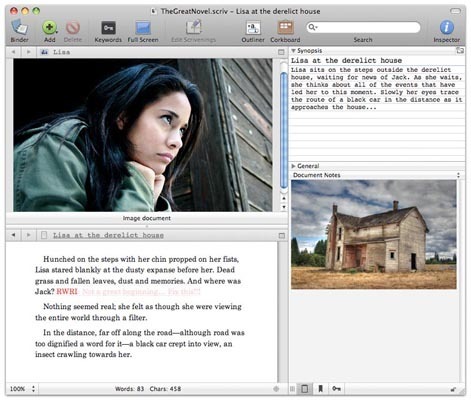Nicky Blue's Blog, page 71
November 26, 2017
The Wife Who Glued Herself To The Ceiling
‘It was the strangest thing. I came in for breakfast and the wife had glued herself to the ceiling. She had her eyes open but she wouldn’t speak, she just stared straight ahead like she’d been brainwashed or something. It was totally weird.’
‘Shouldn’t you be off to work?’ I asked her. No response, not a dicky-bird. She just hung there. ‘Be like that then.’ I said, I had my breakfast and got ready for the office. ‘I’m out with the lads tonight.’ I told her. ‘If I don’t make it home, don’t stay up…or rather come down.’ I was still getting the silent treatment when I walked out the door.
‘Keith, that is well bizarre mate. So who’s gonna up pick the kids?’ Trevor pulled his finger out of his nose and examined it.
‘I dunno, I’m down the bookies after work, how can I do it? I’m not paying for a cab neither.’
‘My wife did something similar,’ Said Trevor, ‘she moved into the attic and refused to come down. She’s been up there eight years now. I have to text her if I want something.’
‘Why did she do that?’
‘I dunno, I never asked.’
Lance looked up from his computer screen.‘You guys are lucky. I came home from work last year and my wife started acting like a chicken.’
‘You what?’ Trevor scrunched up his face.
‘Yeah, you couldn’t make it up could you? She’d bought a chicken suit and everything. The doctor came round, he said there was nothing wrong with her. I’m sure she was just trying to annoy me.’
‘ You see the thing about my wife,’ said Keith, ‘ Is that she’s always got to be different. Always so dramatic about everything. Everyone has at least one affair in their marriage don’t they? I mean, I know I’m no saint!’
‘Don’t blame yourself mate, you’re a good bloke. Anyway… I’ve heard they’ve got a strippergram for Gary’s birthday tonight.’
The post The Wife Who Glued Herself To The Ceiling appeared first on Nicky Blue.
November 17, 2017
5 Comic Fantasy Books To Recommend to Your Friends
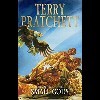 Small Gods by Terry Pratchett
Small Gods by Terry PratchettIn the fantasy humour genre, Terry Pratchett is of course, rare and as a result, it’ll be quite difficult to go wrong with any book from his Discworld series. The Discworld rests upon four elephants who are standing on top of Great A’Tuin an enormous turtle. Although ‘Small Gods’ is not the first book in the Discworld series it is a outstanding novel. I think it displays some of Mr Pratchett’s sharpest wit . How do you exist as being a god if no one believes in you?
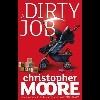 A Dirty Job by Christopher Moore
A Dirty Job by Christopher Moore
A Dirty Job published in 2006, is the ninth novel by Christopher Moore, The story revolves around a ‘death merchant’ called Charlie who is tasked with rescuing and protecting the souls of the dying from the underworld. He does all this at the same as raising a daughter and running a store of course! His life becomes evermore complex as dark forces collude against him! Absurd and wonderful!
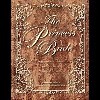 The Princess Bride by William Goldman
The Princess Bride by William Goldman‘The Princess Bride’ is not just a fab movie, it also is one of the most comic and romantic fantasy books ever written. The story of Buttercup,Westley, and their posse engage a high fantasy adventure involving wild beasts, pirates and the odd miracle. It’s a classic!
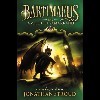 The Amulet of Samarkand by Jonathan Stroud
The Amulet of Samarkand by Jonathan StroudIf, you missed out on the Bartimaeus Sequence, now is the time to grab yourself a copy of the book and read it. It is about a magician’s apprentice who decided to skip ahead in his studies and summon a 5,000-year-old djinni secretly for his own purposes. Luck not being on his side, the djinni he summoned happens to be the snarkiest magical being ever.
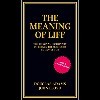 The Meaning of Liff: The Original Dictionary Of Things There Should Be Words For by Douglas Adams and John Lloyd
The Meaning of Liff: The Original Dictionary Of Things There Should Be Words For by Douglas Adams and John Lloyd
One of Douglas Adams most overlooked books I think probably because it is a dictionary! I found this hilarious, it aims to provide new words for the ‘hundreds of familiar experiences, feelings and objects for which no words exist’ For example do you know what an Ely is?
ELY (n.) – The first, tiniest inkling that something, somewhere has gone terribly wrong.
The post 5 Comic Fantasy Books To Recommend to Your Friends appeared first on Nicky Blue.
November 1, 2017
Guest Blog Spot- Blade Runner 2049 Review – By Simon Murnau
This review contains major spoilers!
When Joi – AI hologram and lover of K (Ryan Gosling) – peers into hydroponic jars belonging to Deckard, we briefly hear a low oscillating hum; the same hum heard in Deckard’s apartment in the original 1982 Blade Runner. One of the joys of revisiting Ridley Scott’s early masterpieces Alien and Blade Runner lies in noticing the detailed textures of the worlds he realised, one layer of which is the subtle sound design that makes their technological or artificial environments breathe. The reappearance of this sound shows the meticulous artistry of Blade Runner 2049.
Another aspect of Scott’s organic style in Blade Runner is his use of reflected or mobile light across walls, floors and through windows, notably in Tyrell’s apartment, where Rachel is introduced – a scene echoed and replayed in 2049. Denis Villeneuve amplifies Scott’s technique to almost ridiculous proportions, in Wallace’s water-filled room and in other parts of the Tyrell headquarters, most conspicuously. The monumental Tyrell pyramid now belongs to Niander Wallace, the blind genius who acquired the Tyrell Corporation upon its collapse, using it as the base for his new generation of slavishly obedient replicants. But Villeneuve’s pulls it off, and his bold stylistic choices make 2049 a marvel of light, colour, design and epic cinematography.
The music (Hans Zimmer and Benjamin Wallfisch stepped in after Villeneuve’s go-to guy Jóhann Jóhannsson was replaced, himself having replaced rapper-producer El-P) achieves the impossible. It references Vangelis’ peerless, somnolent score without lazy pastiche, adding deeper strata of darker industrial rasp and orchestral swell. When the elegiac ‘tears in rain’ theme surfaced toward the end, I was close to shedding a tear myself, thankful that my cherished memories of Blade Runner (memory being as important in 2049 as it is in the original) had not been abused, and relieved to be watching a sequel I could celebrate and contemplate on its own terms for a long time to come.
The movie contains too many themes to discuss in a single review but, like its predecessor, 2049 asks the question ‘what does it mean to be human?’ – or sentient, putting it in its broadest terms. The world of Blade Runner – in 2019 as in 2049 – walks the knife-edge between human and artificial life (organic and digital).
Issues of memory, reality, authenticity in a world where nearly every ‘natural’ thing has disappeared or been destroyed, freedom of the body, the will and the spirit, desire, the search for meaning: are all raised by the script. Hampton Fancher, who co-scripted the original (ably joined by Michael Green here), shows once again that he understands the world of Philip K. Dick (Do Androids Dream of Electric Sheep? was Blade Runner’s source). In fact, he inhabits it to such a degree that 2049 is no pale imitation. It is a continuation of Dick’s themes, an extension that feels like part of an ongoing enquiry. These questions are urgent and up-to-the-minute, even as they sit within the genre frame of dystopian sci-fi noir that was definitively crystallised in Blade Runner.
And as with its predecessor, 2049 lends itself to a Marxist/Adornian reading effortlessly. Thirty years may have passed since Deckard’s ordeal with the Nexus 6 replicants, but society remains saturated, administered and degraded by capitalism. Corporations control everything, consumption in all its forms constitutes the sum total of human activity; sex, desire and intimacy are mediated by technology owned, in large part, by Wallace, the pre-eminent oligarch. Capital has destroyed all but the last few traces of ‘authentic’ life, leaving society’s inhabitants adrift in a world that might pay lip-service to the distinction between human and replicant, between individuals invested with a soul and nameless labour units manufactured only to serve, but all meaningful difference between the two has long since evaporated.
This loss of the ‘human’ is the end result of capitalism’s domination of ‘nature’. If all natural things are usurped, overwritten by facsimiles whose only value lies in their exchangeability and profit potential, then ultimately the human being succumbs to its own commodification, becoming indistinguishable from the units of consumption it used to treat as materially inferior. Spirit and individuality dissolve.
Like Tyrell before him, Niander Wallace manufactures replicant slaves, but his are now fully under his control. Wallace is not happy with the limited number of workers his production line is able to bring forth, however, and dreams of owning the means to control replicant-to-replicant procreation. He dreams of commodifying and administering life itself. A male protagonist seeking the means to control organic creation is a theme close to Ridley Scott’s heart, found in Alien (skewed by the lens of horror), Blade Runner, Prometheus and Alien: Covenant. Wallace’s moral and ethical blindness is signalled by his actual blindness, as Dr Eldon Tyrell’s was by his thick-lensed glasses that symbolised his inability to see the suffering his business practices were rooted in.
But there are other replicants in 2049, older models with less built-in constraints, who have slipped through the cracks and are organising in the shadows. They too seek the means to procreate, but freely. They crave a kind of ‘nature’ that would prove their spiritual value and put them on equal footing with humans. Deckard, and his past love for the replicant Rachel, hold the key to Wallace’s and the rebel replicants’ dreams.
Unfortunately, inevitably perhaps, all this pondering the nature of humanity is the preserve of men. Although the movie contains several female characters in authority, women are almost exclusively the product of the objectifying male gaze. 2049 barely scrapes through the Bechdel test (two female characters must exchange a few lines on a subject other than the male protagonists). Three characters have some degree of power, which isn’t bad for a mainstream movie: Joshi, the police lieutenant (Robin Wright), Freysa, the replicant revolutionary (Hiam Abbass) and Marriette, the fabricator of memories who lives in a sealed dome due to illness (Mackenzie Davis). Joshi dresses asexually, an honorary man, the other two are, for different reasons, pariahs or exiles. Most women in the movie are replicants, holograms or sex-workers (replicant sex-workers in many cases). In other words, they are commodified expressions of male fantasy.
In this, 2049 bears out Jaques Lacan’s largely misunderstood statement ‘woman does not exist’. In a society – a symbolic order – under the administering control of patriarchy, female subjectivity is illegitimate, denied, robbed of signifying power. The only thing allowed to occupy its place is the overlay of male fantasy. So, in the ‘real’ world of 2049, woman does not signify, and so does not exist within the symbolic order. This overlay is what makes the only sex scene of the movie so haunting and unsettling. K – as a replicant who earlier refused the advances of an apparently human prostitute – is persuaded by Joi to make love with the same prostitute as she is ‘synced’ with Joi’s holographic emanation. As the body of Joi merges imperfectly with the physical body she has commanded to act as her real-world avatar, we witness a disturbing threesome of sorts, within which Joi is a manufactured digital companion (who does seem to be sentient while remaining proprietary technology) and the prostitute is an exploited sex-worker dressed as a Pris-lookalike (Blade Runner’s pleasure model), who we later discover is herself a replicant. Both are victims of 2049’s culture of numb obscenity and male domination. All are artificial beings enganging in intimacies that the scene depicts as conveying genuine tenderness, authentic love, despite or because of its paradoxes.
The real arises out of the unreal. Replicants have produced offspring (either fully or partially, depending upon where you stand on Deckard’s humanity), and the ‘natural’ has a chance of returning by this ‘miracle’ (as Dave Bautista’s Sapper calls it).
As K approaches Deckard’s hideout, he comes upon teeming beehives. Where have they come from? Medieval thinkers believed that bees were born spontaneously from rotting corpses. In 2049, a dying world, destroyed by joyless consumption, lingering in the graveyard of its own pleasures, begins to show signs of regeneration and innocence, nurtured by those who will apparently cause the final collapse of humankind if they are allowed to survive.
But this innocence is fragile and threatened, and may perish before it finds its strength. It must be hidden, protected, nurtured under domes like the life inside Deckard’s hydroponic jars. Interestingly, this innocent ‘nature’ is synonymous with the (expelled) genuine female subject. Mariette, we learn, is Deckard’s daughter, progeny of a replicant. She is the great miracle, the new thing, but she suffers from a condition that means she cannot survive in the outside world. Exposure would destroy her innate purity, just as exposure to the brutalities of patriarchal capitalism would erase her self-possessed, non-objectified selfhood.
Wallace – as exemplar of the capitalist mind-set – is significantly blind to this dimension of the feminine as ‘nature’ promising a renewal that is perceived as a mortal threat. In this the feminine also stands as the irredeemable otherness of the ‘real’. The hovering machines that Wallace uses to scrutinize the world are shaped like electronic fish. They swim through the air in Wallace’s apartments that are illuminated with golden aquatic reflections. Water has traditionally been associated with femininity (the oceans and their moon-governed tides). It is as if Wallace exists in the feminine element, unable to comprehend it, craving ownership of and authority over it, but unable to comprehend or appreciate its true value.
These threads extend Blade Runner’s themes in ways that qualify it as one of the most successful and provocative sequels in many years. In fact, I am struggling to think of a sequel, made so long after its original, that stands with such assurance on its own merits while connecting so intimately with its progenitor. The incoherent and pointless 2010 (dir. Peter Hyams, 1984), sequel to 2001 (dir. Stanley Kubrick, 1968), shows how easy it is to get it wrong. 2049 gets so much right that its reputation as a classic, and as an object lesson, is assured.
For another free article on Blade Runner Subscribe to the thoughts of murnau film blog For new subscribers, he will send you the exclusive ‘Ridley Scott and the poetry of cinema’ essay. You lucky, lucky people.
Find Simon on Social media:
The post Guest Blog Spot- Blade Runner 2049 Review – By Simon Murnau appeared first on Nicky Blue.
October 8, 2017
A Fantasy ebook Giveaway!
I’m giving away 10 Fantastic Comic Fantasy ebooks . Anyone over the age of 18 can enter.
Neil Gaiman – How the Marquis Got His Coat Back * Christopher Moore – A Dirty Job * Robert Bevan Critical Failures (Caverns and Creatures Book 1) * SM Reine – Drawing Dead (Dana McIntyre Must Die Book 1 * Jasper Fforde – Lost in a Good Book (Thursday Next, #2) * Jonathan Stroud -The Amulet of Samarkand (Bartimaeus, #1) * Patricia C. Wrede – Dealing with Dragons * Michael G. Munz – Zeus Is Dead: A Monstrously Inconvenient Adventure * Sahara Foley – We Journey No More * Robert Their – WARNING! Fairy Tales
By entering you agree to join My Readers List. ( all email addresses are held in the strictest confidence and are not shared with anybody else.)
For Giveaway Terms and Privacy Policy please see giveaway page.This giveaway will end on 29/10/2017 at 10pm
Good Luck!
The post A Fantasy ebook Giveaway! appeared first on Nicky Blue.
September 23, 2017
Fancy Trying Some Flash Fiction?
Not all fiction has to fit a certain length – while the likes of JRR Tolkien and Stephen King may have put away thousands of words over the years, great stories don’t have to take readers days at a time to finish. For those of us who like a challenge, there’s flash fiction – where keeping things short, sharp and concise as well as enjoyable to read is your key focus!
Flash fiction normally weighs in less than 1000 words (sometimes only 100 words!) – which really isn’t too much to work with – meaning that you’re going to need to keep a few things in focus while leaving a few other storytelling techniques behind if you want to keep things short!
The aim of flash fiction is to tell us a story about a character or characters and/or a situation in a bite-size scene or two. You should ideally feel free to do away with overuse of adjectives and adverbs – stick to the meat of the matter. Show us what your characters are feeling through their dialogue, their body language, ‘tells’ about the way they are dressed, etc. The key to flash fiction is to making the words you do use really work for you.
Flash fiction writing is a great exercise for those who are experiencing writer’s block, or who may need some help in balancing ‘show’ over ‘tell’. This type of writing keeps things tight and essential – meaning that padding or throwaway lines can wait for another project. Here is a the last flash fiction piece I wrote (under 100 words!) called The Mystery Staircase.
Getting into flash fiction isn’t hard at all – think about a scene in an interesting photograph, or a pair of bizarre characters you have dreamt up – and consider how much detail you need to provide. Allow the words you use to really tell the story – focusing more on ‘showing’ us than ‘telling’ us what’s going on. As an exercise in learning to curtail exposition and unnecessary padding, it’s highly recommended by many accomplished authors. Why not give it a go?
The post Fancy Trying Some Flash Fiction? appeared first on Nicky Blue.
August 30, 2017
Surreal Writing Prompt
I was on the train the other day and looking out of the window saw three tea bags stuck to a wall. I could see no possible explanation for them being there. There was no tea stands anywhere and it was a long way from the platform making it very hard to throw them at the wall. Also how did they just stick there? and why three? Curiouser and curiouser. The perfect conditions for a surreal writing prompt me thinks. How did they come to be there…..?
The post Surreal Writing Prompt appeared first on Nicky Blue.
August 25, 2017
Terry Pratchett Discworld Novels Giveaway!
I’m giving away five Terry Pratchett Discworld Novels to one lucky winner! This collection comprises: Lords And Ladies, Maskerade, Wintersmith, Mort, Carpe Jugulum. Anyone over the age of 18 living in the United Kingdom can enter.
By entering you agree to join My Readers List. ( all email addresses are held in the strictest confidence and are not shared with anybody else.)
For Giveaway Terms and Privacy Policy please see giveaway page.This giveaway will end on 25/9/2017
Good Luck and May Wizards watch over you! (Not crap ones, good ones)
Sign Up Here
The post Terry Pratchett Discworld Novels Giveaway! appeared first on Nicky Blue.
July 17, 2017
How To Write a Book: Author Interview with Nicky Blue
This is a transcribe of an interview I did for Sukhi Jutla over at The Author Entrepreneurs
I hope you find it interesting!
In today’s interview, Nicky shares:
How he got into writing
His writing practice
Where he sources his inspiration from
How we writes whenever he can
How he deals with Resistance and Procrastination
On using dictation to write
Tell us a bit about yourself, Nicky
Hi Sukhi, thanks for chatting with me. I’m Nicky and have been writing short stories and songs for quite a few years.
I studied Philosophy and Literature at University which inspired me to start writing and then started taking courses in creative writing which got me writing longer bits of prose.
I did it for fun to start with but now I’m taking it more seriously and dedicating myself to writing daily.
What do you write?
I naturally incline towards writing dark comedy and dystopia. The earliest movies that inspired me was the Twilight Zone, and I think that gets reflected in what I write.
I like things when they are slightly out of the ordinary! I’m currently coming towards the end of my first comedy novella called ‘Escape from Samsara’.
It’s a story about a man called Barry Harris whose father has gone missing and needs to employ his best ninja skills to try and save him.
The only thing standing in his way is the fact that he’s not a ninja; he’s a gardener, and he still lives with his mum above a hairdresser in Portslade.
Do you have a daily writing routine?
Yes, but It’s not a consistent one. I tend to go and sit in the local library and get most of my writing done in the afternoons.
However, I write whenever possible, on the bus, waiting for friends, I’ve even been known to nip off for 10 mins to jot an idea down at a party!
What tools/resources do you use to write? i.e. Scrivener?
Yes, I use Scrivener, it is quite simply awesome. I love the fact your novel can be broken up into scenes that you can rearrange and build your ideas in a logical fashion. There is the ability to put in photos as well as plan your characters and settings in a much more visual way. There are free templates designed to work in Scrivener that can a provide really useful framework for planning a novel.
I’m a reformed ‘pantser’! (someone that writes by the seat of their pants!) or rather ‘discovery writer’ is a nicer term. I don’t believe you have to be either a plotter or discovery writer, what works for me is to free write within a loose structure. I find It prevents me from getting too lost.
The other breakthrough I’ve had is finding Dragon dictation software which is fantastic.
I tend to get inspired for story ideas when out in nature or walking along the seafront, so I simply record them in an MP3 recorder on my phone.
When I get home, I upload the file to Dragon Dictate, and it transcribes it for me! How wow is that? It’s really helped my daily word count, and it’s a different way of accessing creativitywhich is always interesting.
You have a podcast- tell us a bit more about that and should writers have their own podcast? What tools do you use to set this up?
My main window is my blog, but I also started using Sound Cloud and YouTube which I link to my blog.
I think it’s useful for writers to have a way of connecting with people whichever works best for them.
I don’t put masses of energy into this, to be honest as it can rob from what I’m supposed to be doing which is writing!
I read somewhere that the writing to blogging ratio should be 80% >20% and that feels about right to me.
If not, when resistance kicks in three-quarters through your novel, as it often does, you can find yourself disappearing down the rabbit hole of blogdom.
Watch Out For ‘Escape From Samsara’, out soon!
The post How To Write a Book: Author Interview with Nicky Blue appeared first on Nicky Blue.

